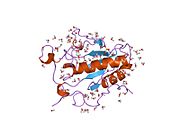Indian hedgehog (protein)
Indian hedgehog homolog (Drosophila), also known as IHH, is a protein which in humans is encoded by the IHH gene.[5][6][7] This cell signaling protein is in the hedgehog signaling pathway. The several mammalian variants of the Drosophila hedgehog gene (which was the first named) have been named after the various species of hedgehog; the Indian hedgehog is honored by this one. The gene is not specific to Indian hedgehogs.
Function
The Indian hedgehog protein is one of three proteins in the mammalian hedgehog family, the others being desert hedgehog (DHH) and sonic hedgehog (SHH).[8] It is involved in chondrocyte differentiation, proliferation and maturation especially during endochondral ossification. It regulates its effects by feedback control of parathyroid hormone-related peptide (PTHrP).[9]
References
- ^ a b c GRCh38: Ensembl release 89: ENSG00000163501 – Ensembl, May 2017
- ^ a b c GRCm38: Ensembl release 89: ENSMUSG00000006538 – Ensembl, May 2017
- ^ "Human PubMed Reference:". National Center for Biotechnology Information, U.S. National Library of Medicine.
- ^ "Mouse PubMed Reference:". National Center for Biotechnology Information, U.S. National Library of Medicine.
- ^ "Entrez Gene: IHH Indian hedgehog homolog (Drosophila)".
- ^ Marigo V, Roberts DJ, Lee SM, Tsukurov O, Levi T, Gastier JM, Epstein DJ, Gilbert DJ, Copeland NG, Seidman CE (July 1995). "Cloning, expression, and chromosomal location of SHH and IHH: two human homologues of the Drosophila segment polarity gene hedgehog". Genomics. 28 (1): 44–51. doi:10.1006/geno.1995.1104. PMID 7590746.
- ^ van den Brink GR, Bleuming SA, Hardwick JC, Schepman BL, Offerhaus GJ, Keller JJ, Nielsen C, Gaffield W, van Deventer SJ, Roberts DJ, Peppelenbosch MP (March 2004). "Indian Hedgehog is an antagonist of Wnt signaling in colonic epithelial cell differentiation". Nat. Genet. 36 (3): 277–82. doi:10.1038/ng1304. PMID 14770182.
- ^ Kumar S, Balczarek KA, Lai ZC (March 1996). "Evolution of the hedgehog gene family". Genetics. 142 (3): 965–72. PMC 1207033. PMID 8849902.
- ^ Vortkamp A, Lee K, Lanske B, Segre GV, Kronenberg HM, Tabin CJ (August 1996). "Regulation of rate of cartilage differentiation by Indian hedgehog and PTH-related protein". Science. 273 (5275): 613–22. doi:10.1126/science.273.5275.613. PMID 8662546.
Further reading
- St-Jacques B, Hammerschmidt M, McMahon AP (August 1999). "Indian hedgehog signaling regulates proliferation and differentiation of chondrocytes and is essential for bone formation". Genes Dev. 13 (16): 2072–86. doi:10.1101/gad.13.16.2072. PMC 316949. PMID 10465785.
- Karp SJ, Schipani E, St-Jacques B, Hunzelman J, Kronenberg H, McMahon AP (February 2000). "Indian hedgehog coordinates endochondral bone growth and morphogenesis via parathyroid hormone related-protein-dependent and -independent pathways". Development. 127 (3): 543–8. PMID 10631175.
- Minina E, Wenzel HM, Kreschel C, Karp S, Gaffield W, McMahon AP, Vortkamp A (November 2001). "BMP and Ihh/PTHrP signaling interact to coordinate chondrocyte proliferation and differentiation". Development. 128 (22): 4523–34. PMID 11714677.
- Vortkamp A, Lee K, Lanske B, Segre GV, Kronenberg HM, Tabin CJ (August 1996). "Regulation of rate of cartilage differentiation by Indian hedgehog and PTH-related protein". Science. 273 (5275): 613–22. doi:10.1126/science.273.5275.613. PMID 8662546.
- Zhang D, Schwarz EM, Rosier RN, Zuscik MJ, Puzas JE, O'Keefe RJ (September 2003). "ALK2 functions as a BMP type I receptor and induces Indian hedgehog in chondrocytes during skeletal development". J. Bone Miner. Res. 18 (9): 1593–604. doi:10.1359/jbmr.2003.18.9.1593. PMID 12968668.
- Long F, Zhang XM, Karp S, Yang Y, McMahon AP (December 2001). "Genetic manipulation of hedgehog signaling in the endochondral skeleton reveals a direct role in the regulation of chondrocyte proliferation". Development. 128 (24): 5099–108. PMID 11748145.







